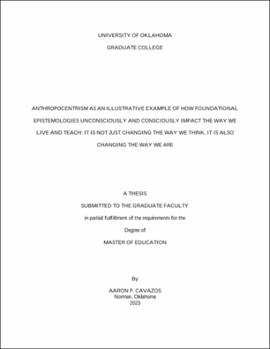| dc.contributor.advisor | Houser, Neil | |
| dc.contributor.author | Cavazos, Aaron | |
| dc.date.accessioned | 2023-12-06T19:30:18Z | |
| dc.date.available | 2023-12-06T19:30:18Z | |
| dc.date.issued | 2023-12-15 | |
| dc.identifier.uri | https://hdl.handle.net/11244/340001 | |
| dc.description.abstract | Climate change poses an immense threat to the planet and all life on earth, and yet in public education the environment continues to be an afterthought. The largely unnamed phenomenon of anthropocentrism is a driving force underlying why the environment has been largely ignored. Anthropocentrism is when people rationalize themselves as existing above other life and has become an epistemological basis for hierarchical thinking and domination. Meaningful environmental education works to name and dismantle how humanity places itself above all other living beings. However, meaningful environmental education faces immense opposition because of the dominant anthropocentric mindset in education and beyond. That mindset goes unnamed in the educational discourse but is an integral part of the discourse itself. Therefore, there is resistance when critiquing the anthropocentric mindset and imagining new alternatives and possibilities. As a result, public education currently perpetuates and protects anthropocentrism.
This critical qualitative study explored how the difficulty of naming anthropocentrism manifests in K-12 education to create obstacles teachers face when trying to teach about the environment in meaningful ways. First, I examine the concept of anthropocentrism, why meaningful environmental education works to name and critique the phenomenon, and how K-12 education currently fails to do so. Second, I will explain the theoretical lens that I used to examine the data where I emphasize the importance of naming our obstacles and the power of discourse based on the work of Maxine Greene and Michel Foucault. Third, I detail the methodology and introduce my participants. Fourth, I share what I found and apply my theoretical lens to my analysis of the data. Finally, I discuss the possibilities available once anthropocentrism is named and a part of the discourse. | en_US |
| dc.language | en_US | en_US |
| dc.rights | Attribution-NonCommercial-NoDerivatives 4.0 International | * |
| dc.rights.uri | https://creativecommons.org/licenses/by-nc-nd/4.0/ | * |
| dc.subject | Anthropocentrism | en_US |
| dc.subject | Environmental Education | en_US |
| dc.subject | Discourse | en_US |
| dc.title | Anthropocentrism as an Illustrative Example of how Foundational Epistemologies Unconsciously and Consciously Impact the way we Live and Teach: It is not just Changing the way we Think, it is also Changing the way we Are | en_US |
| dc.contributor.committeeMember | Brugar, Kristi | |
| dc.contributor.committeeMember | Youngbull, Natalie | |
| dc.date.manuscript | 2023-12-04 | |
| dc.thesis.degree | Master of Education | en_US |
| ou.group | Jeannine Rainbolt College of Education::Department of Instructional Leadership and Academic Curriculum | en_US |
| shareok.orcid | 0009-0008-2685-4000 | en_US |
| shareok.nativefileaccess | restricted | en_US |

